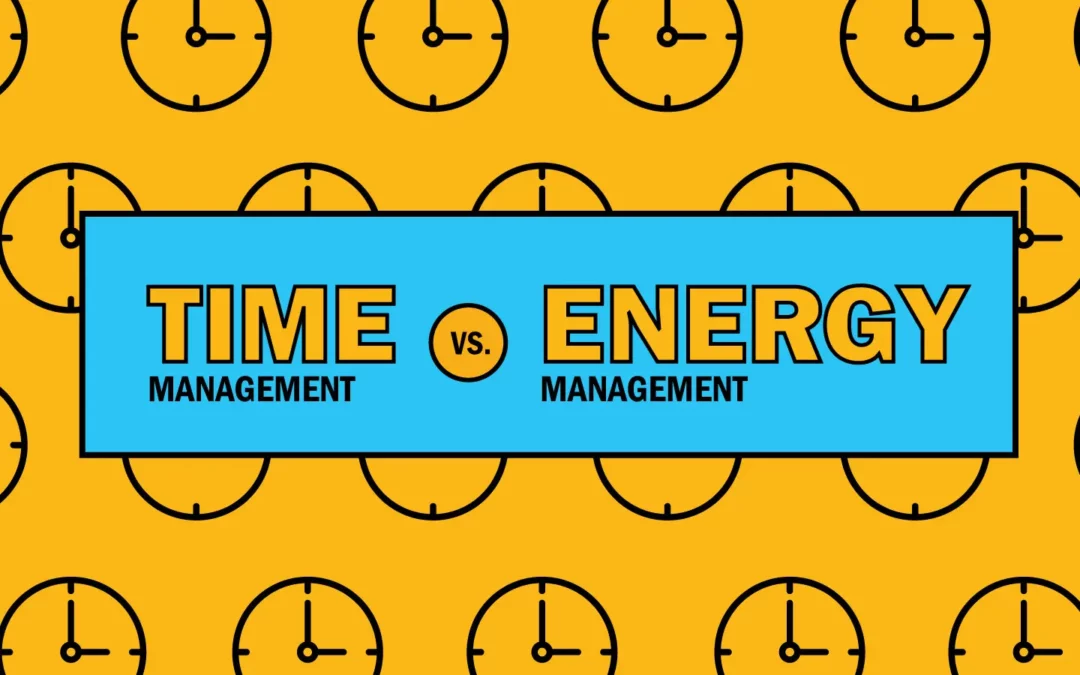What is Time Management?
Time management is one of the most common methods of ensuring you stay on top of your life. It’s what it sounds like; you schedule all your daily tasks into timeslots throughout the day to make sure you have enough time to get them all done. Although this is undoubtedly a useful skill to develop, it can also cause you to feel obliged to follow a fixed schedule. Failing to adhere to your schedule can leave you feeling guilty or not knowing how to get back on track. If you end up not being able to follow your schedule – if something comes up that gets in the way, or you just simply can’t bring yourself to follow it – you can end up finishing your day feeling unsatisfied and unproductive. Leaving yourself with a rigid schedule based strictly on time doesn’t allow room for the day’s natural ebb and flow. By scheduling your day only by the hours in it, you end up fighting with your natural daily energy flow, making the things you want to do seem more like things you have to do.
What is Energy Management
An alternative to time management is energy management. Although this method is perhaps a little less straight forward than time management, energy management is about being aware of your mental and physical energy levels throughout the day and then schedule your day accordingly. By working with the natural pacing of the day, you can manage your time without burning yourself out or feeling guilty for not following your self-made schedule. Are you the most energetic first thing in the morning? Schedule your most challenging task for then. Do you feel a lull around 3-4 pm? Schedule time for a break around that period instead of trying to push yourself to just keep working through it. Being aware of your daily energy levels, and which activities deplete or restore those energy levels, can help you feel more accomplished at the end of the day. You are using your time in the wisest way possible, rather than using willpower to push yourself through your tasks. Highs and lows in your day are unavoidable. Rather than feel guilty for not being energetic enough to do all the things in your schedule, energy management allows you room to complete the things you want without feeling like you need to push yourself to your breaking point.
Benefits of Energy Management
We are not productivity machines; we cannot just make ourselves get more things done if we don’t have the energy to do them. Our mental and physical states impact every aspect of our lives. We cannot ignore them to try to create more output. As inconvenient as it may be, our mental and physical health sometimes demands a place in our schedule. Giving them their place will make you more productive in a way that will make you feel accomplished. By building your schedule around your mental and physical energy, we lessen the likelihood of burnout. We are routinely taking care of ourselves instead of waiting until we absolutely need to. By managing our energy rather than just our time, we use our time more effectively to accomplish things we can feel proud of. It’s great to get a bunch of things done in one day, but does it feel that great when none of them are done particularly well? If you can’t feel proud of your accomplishments, they lose their appeal. Energy management is not just about optimizing your time to get things done. It’s about feeling good about the way you used your time so that at the end of the day, you can feel like it was time well-spent. Time management is great, but it doesn’t really matter how organized your schedule is if you have no energy to follow it.
How to Manage Your Energy
The actual practice of managing your energy is a little more complicated than just understanding the concept of energy management. Like all things, it comes with practice, but there are ways to get started. The first necessary step in implementing this method is to note the natural ebb and flow of your energy throughout the day – which times you feel your most energetic, and which times you tend to crash. After that, note which activities tend to restore your energy, and which ones deplete it. If you have a draining activity, try to schedule it for a time when you feel more energetic. If there is an activity that restores your energy, schedule it for times in the day where you experience a lull. Not to say you should always try to have your energy up. Throughout the day, highs and lows are unavoidable and remind us of why it’s so important to take care of ourselves. If you have something scheduled that you know will require a lot of energy, but it’s at a time you’re not typically energetic, try to schedule an energy-restoring activity before, so you don’t end up running on reserve energy and risking the possibility of burnout. Remember that the purpose of lifestyle habits like these is to make your life better, and you shouldn’t feel pressured to do something that does not work for you. Because of these methods’ subjective nature, it requires time and practice so that you can personalize it to fit your own needs.
For a more in-depth explanation of how to implement this system and its benefits, check out “The Power of Full Engagement: Managing Energy, Not Time, Is the Key to High Performance and Personal Renewal” by Jim Loehr and Tony Schwartz.
Wellbeing blogs are written by the SAMU Wellbeing Assistant, Lauren Rundell.

